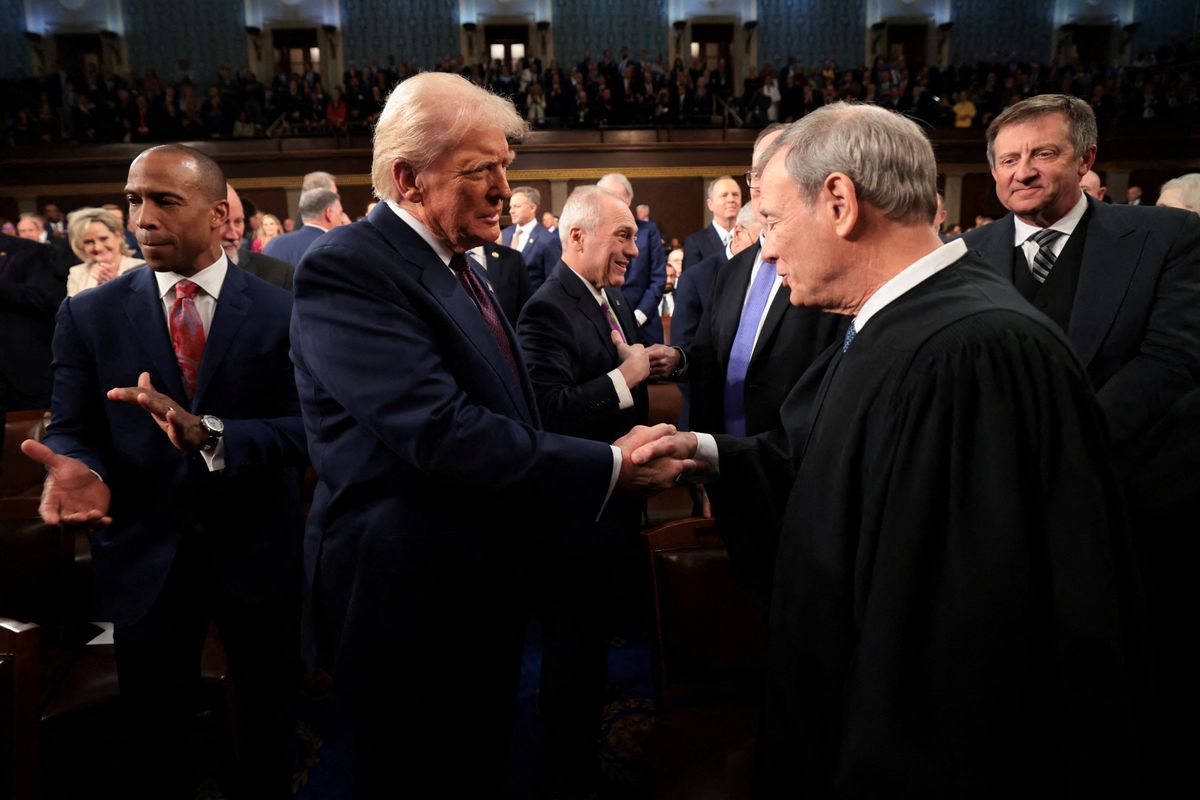
The U.S. Supreme Court's decision to grant Donald Trump sweeping immunity from criminal prosecution already looks even worse than when it was handed down last summer, a columnist wrote Tuesday.
Just four months into his second presidency, Trump has challenged the limits of judicial authority to their breaking point, wrote Slate's Mark Joseph Stern, and those tests enabled by the justices could ultimately render the court irrelevant.
"In the course of effectively exonerating Trump for his misdeeds, the Supreme Court endorsed a corrupt vision of the presidency in which self-dealing, partisan retribution, and abuse of power were reframed as legitimate, even laudable constitutional prerogatives of the chief executive," Stern wrote.
"Trump’s second administration has, predictably, embraced this cynical conception of executive authority, with devastating results for democracy and civil liberties."
Trump has weaponized the court's decision to elevate himself above democratic institutions and target his enemies with unlawful retribution in ways the justices never could have foreseen when they wiped away his criminal prosecutions, Stern wrote.
"The majority may have also failed to foresee the ways that Trump would use the decision to diminish the court’s own power," Stern wrote. "Having freed the president to burst past existing constitutional restraints, the justices must now try to preserve their own authority from executive encroachment."
EXCLUSIVE: Trump accused of new grift that puts Qatari plane in shade
The court has tried to have it both ways as the president challenges the limits of his own powers and dares the justices to stop him, Stern added.
"A malignant dynamic is now unfolding between an imperial court and the president whom it crowned 'a king above law,'" Stern wrote. "The conservative supermajority continues to pursue its own agenda, which includes an aggressive expansion of executive authority. But it is doing so at the worst possible time, when the presidency has been captured by an aspiring authoritarian who defies all constitutional constraints.
"So the Supreme Court is caught between its own desire to shift the law rightward and its fitful inclination to shoot down Trump’s most extreme moves — if only to preserve its own power."
Chief Justice John Roberts declared in the immunity ruling that the president alone can enforce, or decide not to enforce, federal law — and the consequences of that largely made-up interpretation of the Constitution are being felt across the government, Stern wrote.
"The majority seems at once delighted that Trump is creating opportunities to shift the law rightward yet distraught that he sometimes pushes to the point of encroaching on the court’s own power," Stern wrote.
"Its solution, for now, is to continually stake out middle ground when conflicts between the two branches’ agendas arise. By doing so, the court is all but encouraging the administration to test, if not blow past, the limits of its own decisions. It has repeatedly endorsed the president’s interpretation of Trump v. U.S. as a near-boundless grant of executive authority. No one should be surprised when Trump concludes that the bounds of his power extend well beyond the Supreme Court’s own rulings."
"Some of the conservative justices may be perturbed that the White House is effectively demoting the judiciary from a co-equal branch of government to a bothersome layer of bureaucracy that can be overridden or ignored," Stern added. "If so, the blame for surrendering the court’s legitimate claim to equal authority falls squarely on the court’s own shoulders."




